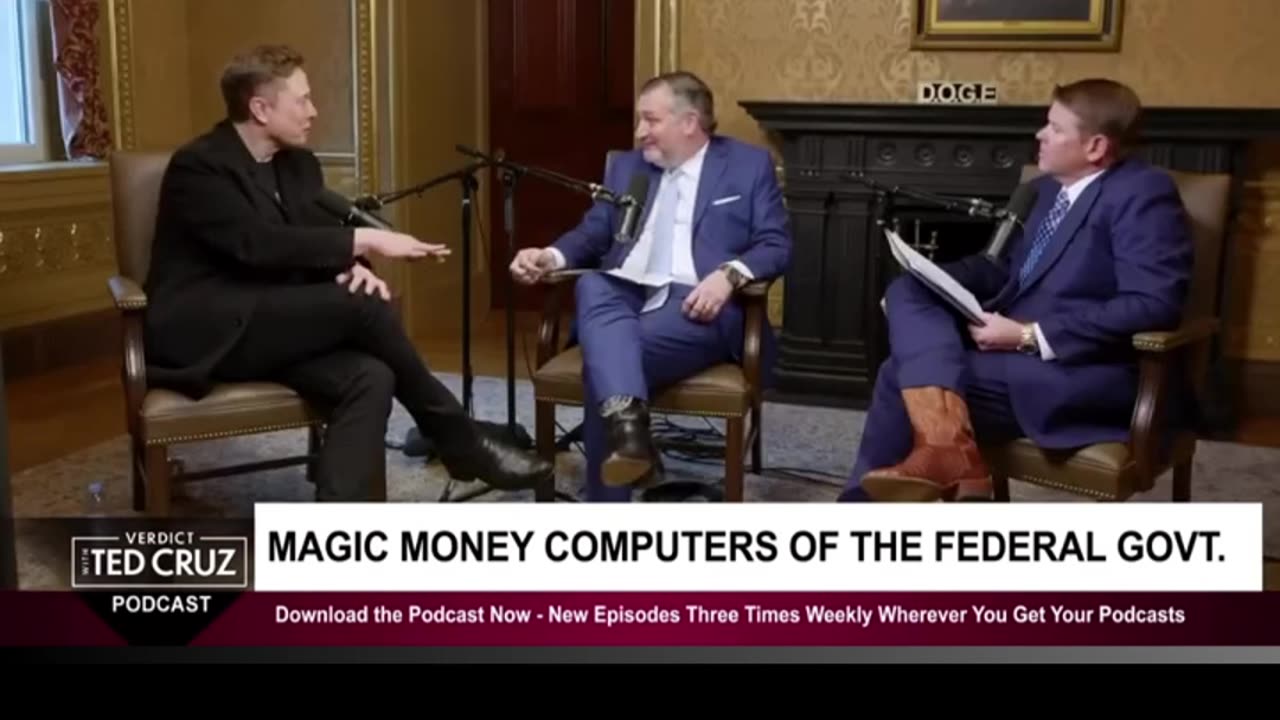Elon Musk reveals 14 magic money computers that send money out of nothing
Elon Musk: "You might think that government computers all communicate with each other, synchronize, add up the funds going somewhere, and it’s, you know, coherent that the numbers, for example, that they present to you as a senator, are really the correct numbers. One would think that. One would think they’re not."
"Okay. I mean, they’re not entirely wrong, but they’re probably off by about 5% or 10% in some cases."
"So I call a magic money computer any computer that can create money out of thin air. Better magic money. So, how does it work? It just issues payments."
Ted Cruz: "And you said there are something like 11 of these computers in the Treasury sending trillions in payments?"
Elon Musk: "They’re mostly in the Treasury. Some are, there are some in HHS, some in, there’s one or two in the states, there are some in the DOD. I think we discovered 14 magic money computers. They just send money out of nowhere."
Elon Musk, leading the Department of Government Efficiency (DOGE), has claimed to have identified at least 14 "magic money computers" within the U.S. federal government. According to Musk, these are systems capable of issuing payments without tangible financial backing, essentially creating money out of thin air. They are said to be spread across various agencies, including the Department of the Treasury, the Department of Defense, and the Department of Health and Human Services.
Musk points out that, contrary to the assumption that government systems are interconnected and coherent, they actually exhibit significant deficiencies. These flaws would allow payments to be issued without clear justification, contributing to wastefulness and inefficiency in public spending. Furthermore, he has observed that the government overpays for inefficient software and that, at times, the systems are unable to verify the legitimacy of payments, preventing basic audits.
The identification of these "magic money computers" has raised concerns among federal auditors, who criticize DOGE's approach for lacking proper procedures and failing to follow standard auditing practices. Errors have been pointed out in DOGE's reports, suggesting that its actions could be contributing to inefficiencies and mismanagement rather than improving government efficiency. However, despite these criticisms, DOGE has been the only one able to identify the waste of hundreds of billions of dollars. Were the critics, who call themselves experts in auditing, unable to identify the misappropriation and corruption in taxpayer money? Or, worse yet, did they not want to realize it?
In summary, Musk's statements about the existence of systems capable of generating payments without financial backing highlight potential vulnerabilities in the U.S. government's financial infrastructure. However, it is essential to approach these claims with caution, considering the criticisms of DOGE's approach and methodology in its evaluation of government systems.
-
0/2000
-
 0:41
0:41
Gateway Hispanic
3 days ago¿TRUMP quiere RECORTAR fondos a las escuelas?
5 -
 9:02
9:02
ARFCOM News
16 hours ago $1.63 earnedTrump Fixes Concealed Carry | Time Travelling Judge | DoJ Goes After CA Infringements
19.3K3 -
 18:05
18:05
Mrgunsngear
15 hours ago $2.25 earnedHeckler & Koch VP9A1 K Review: The Best Do All Handgun?
17.2K4 -
 14:40
14:40
Clownfish TV
14 hours agoDisney Getting DESTROYED by YouTube...
16.4K4 -
 10:28
10:28
ariellescarcella
14 hours agoThis Is NOT A Normal Face : The Psychology Behind Woke Manipulation
11.1K4 -
 57:56
57:56
CharLee Simons Presents Do Not Talk
2 days agoHow to Win the Minds of the APATHETIC RIGHT with Joe Ming & Sam Anthony
8.2K -
 9:15
9:15
VSOGunChannel
11 hours ago $0.46 earnedWhy Haven't They Freed the ATF's Political Prisoners?
6.41K5 -
 49:01
49:01
Standpoint with Gabe Groisman
1 day agoHigh Fashion Canceled Her for Working for Trump
17.2K6 -
 36:24
36:24
The Brett Cooper Show
1 day ago $17.50 earnedSnow White. What Happened? | Episode 18
110K76 -
 1:19:17
1:19:17
Mike Rowe
1 day agoA Fun Hang With My Very Famous Friend | Enrico Colantoni #430 | The Way I Heard It
31.8K7

0 Comments